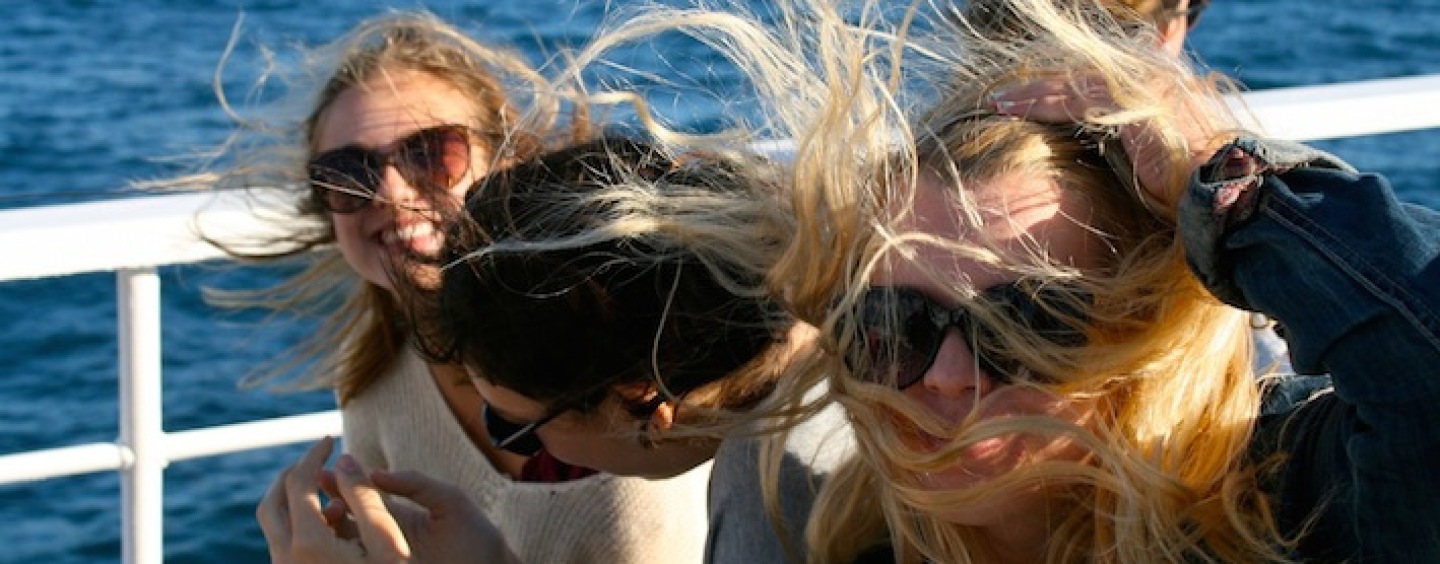Being regularly exposed to harsh environmental elements, the hair is something that boaties often take for granted. Everyone talks about taking care of the skin by protecting it with sunscreen, but how can we keep our hair healthy when living on a boat for days, weeks, or even permanently?
Hair Health
It is important to think of the health of your hair when you are out at sea or out on the water—whether you are on the boat or immersing yourself in the cool waters of the ocean. “Prolonged exposure to the elements—being saltwater, sun, and even the wind—can be very detrimental to a person’s hair due to the hair’s protein structure (keratin). These elements dehydrate the hair, reducing the elasticity and strength of the hair, ultimately causing the hair to weaken and be more prone to breakage,” explains Mandy Morgan, owner of Amara Organic Hair Salon in Burleigh. Likewise, Jessica King, of Stefan Hairdressing emphasises, “Harsh environmental elements can result in dull, lifeless hair and a dry, irritated scalp. So being conscious of your hair health when out on the water is vital.”
Common hair problems when boating
“Unmanageable hair is a frequent problem faced by both men and women when out at sea due to unkind winds and salt in the air,” says Jessica. “Other common issues include dry hair and lack of moisture.” Mandy adds, “Sunburn to the scalp can also be a problem, causing the scalp to be dry, itchy and flakey. If you get a sunburnt scalp, use a sensitive range of shampoo and conditioner to help soothe and calm the scalp.” Whether sporting a long hair or a short one, women should address tangles while exposed to the ocean wind and waters. Jessica advises, “It is highly recommended for women with all hair lengths to brush a treatment through the mid-lengths of the hair after swimming to stop any knotting or tangling occurring.” For long hair, Jessica recommends tying it up when swimming and when in the sun. This will drastically reduce tangles and excessive exposure to UV rays. “Another way to care for your hair—and a fashionable one at that—is to wear a wide-brimmed hat for the ultimate protection from the sun and wind.” A tip for men out on the water is to wear a hat when in the sun. “It is critical for not only protecting your skin but also your hair,” says Jessica. She also recommends that men use an oil-based hair treatment after swimming and sun exposure to effectively moisturise and hydrate the hair and scalp. She emphasises that it is also fundamental for men to brush the scalp thoroughly to avoid dryness and itchiness.
Maintaining healthy hair while boating
Both Jessica and Mandy suggest using hair protection when boating. Jessica says, “Use a heat-protector spray to protect hair from the damaging effects of UV rays and shield the hair from everyday environmental stresses. For treated and coloured hair, apply a leave-in treatment to your hair before and after swimming, to help lock in colour and restore much needed moisture.” Mandy also suggests applying leave-in moisturiser after washing the hair. “This will help balance the hair’s PH levels, and seal and protect the cuticle from any further damage.”
Mandy further recommends a regular haircare regimen. “Rinse your hair throughout the day, especially after swimming or after being out in the elements. Always shampoo your hair twice. The first shampoo will cleanse the hair of any salt, sand, chlorine or hair-care product build-up. The second one should be left for a minimum of two to three minutes to strengthen and hydrate the hair. Apply a conditioner from roots to ends leaving in for a minimum of two to five minutes, to protect the scalp, help close the pores and the hair’s cuticle, and rebalance the hair’s PH level. Use heating tools no more than twice a week.”
For hair washing, Jessica’s advice is to “use an oil-based shampoo and conditioner preferably those that contain certified organic coconut oil, to assist in replenishing moisture and nourishment back to your hair.” Regular treatment is also suggested. “Apply protein and/or moisture treatment to strengthen and hydrate your hair. Leave on from five to 20 minutes depending on the strength of the treatment. Do this once or twice a week,” according to Mandy.
Mandy further advises that, “Anybody who spends a lot of time boating who is exposed to the elements on a regular basis should consult with a professional hairdresser to determine the current condition of the hair. A tailored home-care maintenance program can be advised that is specific to individual needs.”
By Roselle Tenefrancia






























